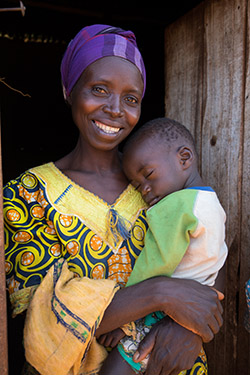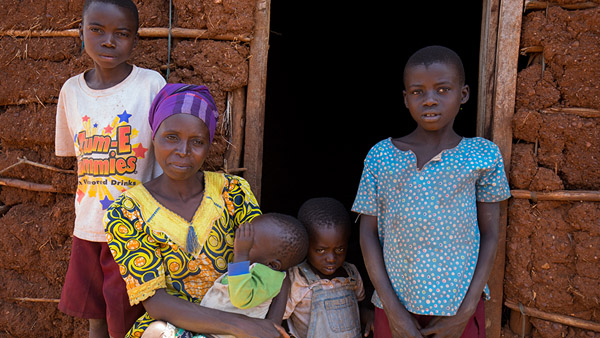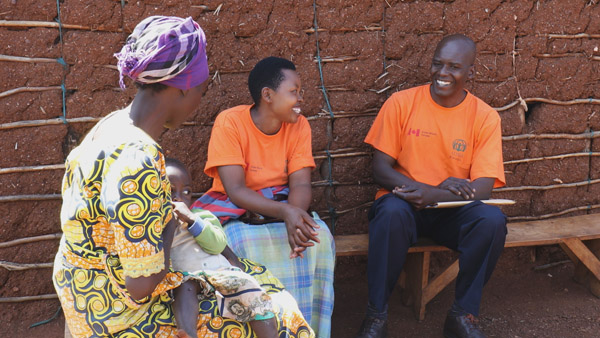No Longer in the Yellow Zone!

“My babies are no longer in the yellow zone!” she said with a grateful smile.
Phorothene and her husband, along with their six children ranging in age from one to 14 years, have recently moved to the Kayonza district of Rwanda. Their home is a mud brick house that they rent from a local farmer. Her husband is a day laborer, working in nearby fields of land owners, earning about $1.50 CDN per day. This is all the income they have to feed their family of eight, pay the rent, and cover all other expenses.
Shortly after the family moved into their house, Phorothene was visited by ADRA volunteers from the community and she was invited to become a member of our PROMISE project.
ADRA asked Phorothene to visit the local clinic and have her children assessed. Two of her children were in the “yellow zone”, which indicates moderate malnourishment. The children were put on an intensive nutritional therapy program and Phorothene started attending every PROMISE meeting to find out what she could do to improve the health of her children.
At the meetings, Phorothene learned many new concepts on health, hygiene and nutrition. Along with other mothers in her community, she learned what foods to combine to provide her family with a good balanced diet.
“If ADRA had simply told us about the new foods that we should start using when we cook, it probably would not have helped us very much. There is no way that we would have been able to afford to buy the vegetables in the market. ADRA taught us not only what to eat but also how to grow the food, right beside our houses!
Here, we were only renting the house, not any of the land around it, but I got permission from my landlord to start a kitchen garden beside the house. I recently gave him some of the vegetables I had grown so he and his family could give them a try. After tasting them he told me to go ahead and cultivate as much land around the house as I want! Right away I planted more gardens and I am now growing enough that I am able to sell some vegetables in the market for a little extra income. I am so excited about this that I am now going around to some of my neighbors and asking them if they have any land that I can use to grow more vegetables on a sharecropping arrangement. I believe that there is a good income opportunity here!
I am so grateful to ADRA and the PROMISE project. I have learned so much. All of the advice, training and support that we have received has been very helpful. I never want to miss a single meeting! In addition to the group meetings, ADRA workers actually come out to my home to visit. We talk about gardening and life in general. This gives me a chance to ask questions that I may not be brave enough to ask in front of the group. We have talked about good parenting, gender roles and the importance of family planning. I have only been a member of PROMISE for about nine months but already it has brought us up to a much better position. My children are gaining weight and are no longer in the yellow zone! All of us are much healthier because of the vegetables we are eating now.
I would like to thank ADRA Canada and the people of Canada who are supporting us here with the PROMISE project. We are loving you, loving you, for all of the help you are giving us! We send our greetings to you and we wish that there is something that we could do to repay you. We pray that God will bless you for the work that you are doing for us.”
PROMISE is a four year project that is improving the lives of over 100,000 people in 96 communities in eastern Rwanda by supporting 18 health posts and hospitals, including with the donation of an ambulance that is serving emergencies in the more remote villages.
PROMISE is funded through Global Affairs Canada and being implemented in partnership with Christian Children’s Fund of Canada and Emmanuel International.

Phorothene with four of her children in the doorway of her home.

Giving a personal touch, ADRA workers visit Phorothene at her home.

Using the latest permaculture methods, raised-bed kitchen gardens produce rich harvests right in to the harsh dry season, in the Kayonza district of Rwanda.
Let's make a difference together!
Related News and Stories
- News Releases
- News Releases
- News Releases
- News Releases, Stories